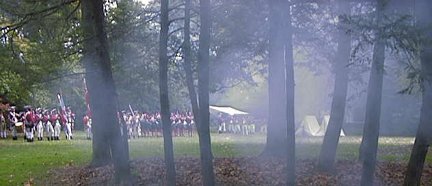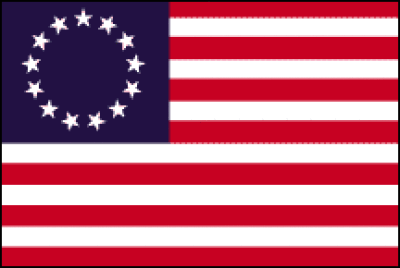Battle Of Germantown
October 4,1777
Philadelphia, PA
A Brief History
In September of 1777, after victorious encounters with American troops at Paoli and Brandywine, British soldiers occupied the Capital of the Revolutionary government...Philadelphia, PA.
Several thousand British troops were
stationed about 6 miles Northwest of the City in a village called Germantown.
In early October 1777, General George Washington plotted to recapture the city. His battle plan called for an assault on Philadelphia from the Northwest, aimed straight through the center of Germantown. Overnight and through the early morning hours of October 4, 1777, as many as twelve thousand American soldiers moved South towards Germantown by several different routes. They were hoping to catch the British by surprise. General Washington himself was with the troops attacking on the Germantown Road through Chestnut Hill and Mt.Airy.
Advancing American Soldiers on the Germantown Road encountered a British outpost in nearby Mt.Airy. A burst of artillery fire from the alarm cannons alerted British Colonel Thomas Musgrave and the 40th Regiment, who were camped in the fields around Cliveden (the ten year old summer home of Justice Benjamin Chew). The 40th Regiment having been forewarned had time to barricade themselves inside the stone walls of Cliveden, from where they could fire on the advancing American troops.
General Washington's plan was spoiled not only by the unexpected British opposition, but the autumn weather and a heavy fog that shrouded most of the area that early morning. Washington's troops stalled in front of Cliveden by heavy fire from the British, were unable to rendezvous as planned with the other segments of his army at Germantown's Market Square.
After several long hours of intense fighting in and around Cliveden, the American attack fell apart. The Americans retreated back into Montgomery County and on to a long winter at Valley Forge. Left behind in Germantown and on the grounds of Cliveden were 150 dead American soldiers. British casualties were less severe.
In conclusion...The Americans did lose the battle, but not for lack of trying. The combination of their valiant effort at Germantown and a victory at Saratoga secured French support for the American cause.
Cliveden was damaged heavily in the battle, was sold and then repurchased before 1800 by Benjamin Chew's Son. It remained in the Chew family until 1972 when it became a National Trust Historic Site.
For information about Historic Germantown, The first German settlement in the New World,the nation's earliest "urban village", the site of the first written protest against slavery,the setting of the Battle Of Germantown, and much more of it's rich and unique past, visit the
Germantown Historical Society website.
Click each Star and Stripe on the Flag OR click the links below and travel back in time to witness the Battle, through my photographs of this years 19th annual Battle of Germantown reenactment, held on October 7,2000.
Home To Justinalee.Comô
Copyright © 1998-2004 Justinalee.Comô


